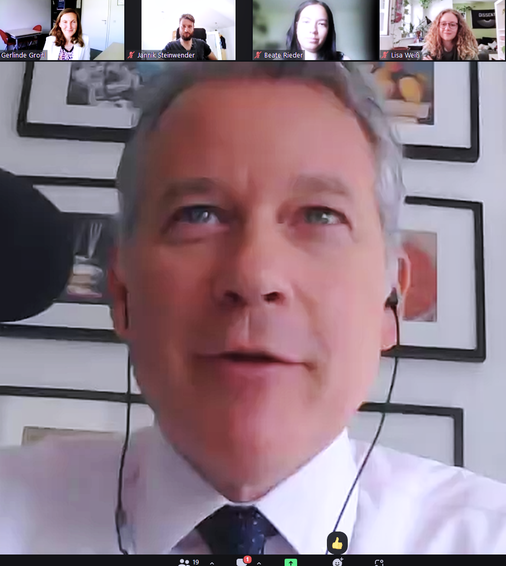(In)Securities: America’s European Agenda
Jeff Rathke, U.S. expert on Germany, talks with UR students and Dr. Gerlinde Groitl about German-American relations and the transatlantic partnership
22. Juni 2023
Washington and Berlin: How do they get along? What is on the agenda, what will shape their relationship in the future? On 22 May 2023, Jeff Rathke, President of the think-tank American-German Institute AGI, at the Johns Hopkins University in Washington, DC, gave a two-hour-talk on “Germany and the U.S. – Future Challenges to the Core of the Transatlantic Partnership”. Rathke was invited to her seminar with master and doctoral students by Dr. Gerlinde Groitl, Associate Professor in International Politics and Transatlantic Relations at the University of Regensburg.
The lecture was part of a speaker series on transatlantic security issues titled (In)Security: Europe and America in the Modern World that Groitl organized with the Leibniz ScienceCampus Europe and America in the Modern World, where she coordinates the research module Transatlantic Political Transformations.
In an interactive two-hour talk with UR’s Democracy Studies students and their lecturer, Rathke shared numerous interesting aspects from the center of American politics. Prior to joining the think thank community, Rathke worked for the State Department. Among others, he served as deputy chief of staff to the NATO Secretary General in Brussels, as minister-counselor for political affairs in Berlin (2006–2009), and at U.S. embassies in Dublin, Moscow, and Riga.

Jeff Rathke started by analyzing the status quo of the transatlantic partnership: There was “a lot of energy on taking the temperature” on EU-US-relations, he said, and noted “a striking moment”: The mutual dependance had remained very high - even when there were serious problems or disagreements in the transatlantic relationship. Subsequently, there was desire and interest in resolving them or at least minimizing them.
Washington and Berlin
So, Washington, how do you feel about Berlin? Rathke reminded the students of the complexity of things: there are matters of great importance to Germany, yet they are handled on a European level. Among the common near-term challenges was support for Ukraine, and “the scope of the challenge is recognized”, Rathke said, restating the remarkable resource commitments both sides have made. Of course, there were disagreements on the pace and type of support as well as on the future relationship of the EU and Ukraine. At the same time, there were bigger challenges from the American point of view: The nature of Chinese policy shifts would require conceptual changes and decisions, even though the US and Europe possess a significant economic relationship with China at the same time.
“Germany has been the central focal point of our approach to Europe. That changes from time to time.” Rathke highlighted the peak period of American global power after the end of the cold war, for instance when it came to the war in Afghanistan and “the fight against Islamic terrorism”. The USA became “the indispensable nation” (as former US-Secretary of State Madeleine Albright once proclaimed) and Rathke is convinced: “Germany has this role in Europe”. It was impossible for the US to achieve anything by working only with Central and Southeastern Europe. Germany had an “equilibrium seeking approach to Europe”, the speaker said and “the US needs Berlin in order to accomplish its goals for international partnership.” That required a certain amount of patience – and enduring frustration was necessary as well: “Germany is reluctant when it comes to the use of force in security policy, it needs broad support in Europe due to its history.” The US however needed a “partner in leadership” who was prepared to take on responsibilities and to risk something, Rathke noted.
What about Paris? “There are very finely tuned balances inside Europe.” France was, he argued, effectively complementary to the German role: “It has a level of comfort to use military force in order to address military challenges, the US is able to connect that way.” The US appreciated “the can-do-spirit that the French bring to many problems”. However, there were serious limits about the French vision regarding the role of Europe as a distinct actor: “Triangles or even bipolar models would not bring us very far”, Rathke is convinced.
And then there is China
What is the role of China and its politics when it comes to the transatlantic partnership? For Rathke, there are three reasons why Germany plays a key role when it comes to dealing with China. The first reason was economic: Germany has the most significant economic relationship with China among all European countries, Rathke emphasized, with the German automobile industry particularly heavily invested in China. However, this is not an exclusively German industry, since German car companies are involved in countries all along the Danube as well as Poland. It was necessary for US policymakers to understand the nature of this relationship and to take it into account when designing their relationship with Germany.
Second: Germany is the epitome of a country that has grown and anchored itself in a rules-based trading order, Rathke said. Therefore, it was difficult for Germany and the EU to move beyond those policy boundaries: “If you believe - as the current US administration does and a majority of American foreign policy thinkers do - that the rules based trading order is insufficient to take account of the strategic international security challenges arising in the global economy, then you need to find a way to supplement that rules based trading framework with additional elements that can promote, and preserve national security and be consistent with strategy.” Germany needed to be part of that, he stated.
And Rathke had a third point: Since its foundation in 1949, Germany has been a country avoiding confrontation where possible. It was not a good idea to replicate the cold war arrangements that Germany was part of and which were painful for Germany as a divided country: “The US needs to be able to persuade countries like Germany that it is not embarking on a cold war 2.0 when it looks at its relationship with China.” So, “Überzeugungsarbeit” (persuasion) was necessary: “The US has to take account of the sensitivities and concerns of its big international partners and avoid any impression that there was kind of a back-to-the-future-exercise.”
Germany and the Indo-Pacific region
What does the US expect from Germany, one of the students asked. “This is a fascinating question”, Rathke answered. It was not only about what the US might want to see, it was also about a new version of the burden-share-discussion arising. According to Rathke, this is debated now in Washington as “it is foreseeable that China in the next five to 20 years could try to absorb Taiwan by force”. The US would be drawn into this conflict in some way, Rathke assumed, and if not directly, then “due to Chinas growing military capabilities and ambitions”. Consequently, he argued, “The US must focus on the Indo-Pacific when it comes to security and military; that means – it cannot do the same in Europe at the same time.” The US must start immediately to reduce its obligations in Europe should the situation in the Indo-Pacific region become acute, Rathke argued, and it would have to “force its European partners to assume its burdens.”
Notabene: The burden was not about Germany’s obligations within Europe only but about the German role in the Indo-Pacific: “Germany has economic influence in China, there are German businesses in China, and Germany could be confronted with strategic moments, such as taking production lines out of China.” The US wanted Germany “to be here a bit more specific and consistent” when it came to showing the flag and send a message of international solidarity.
The next Presidency, the budget, and Ukraine
At the end of his talk, Rathke reminded his audience that “American Presidential elections are generally not fought and won over foreign policy, but domestic policy.” Between now and summer 2024 there was one important thing: Congress had to pass the budget for the next period. As resources were significant “when it comes to Ukraine and continued support of Ukrainian armed forces”, Rathke said, “that is the real challenge”. Political fights between the Biden Administration and the Republican majority in the US House of Representatives might cause shutdowns, Rathke fears, and a discussion about Ukraine could come up in the primary elections. However, this was a side show. If Biden was successful. “This should keep us awake at night on this side of the Atlantic”, Groitl adds, convinced, that “without the support offered by the Biden administration, Ukraine might not exist anymore.”
But are there also conflict lines within the Democratic Party? “Some people say Ukraine is costing us a lot of money, we should use it on our infrastructure, e. g. on education”, Rathke answered. “But those are not the people setting the agenda of the Democratic Party, they are not driving the debate.” Ukraine was not a defining or shaping issue, there was no cross-party-anti-Ukraine resistance. The criticism the Biden administration had to endure was similar to what the German government has to deal with: That the government was too slow to provide assistance to Ukraine, and that it was not providing the advanced quality of weapons fast enough in order to make successful counter-offensive.
At the end of Rathke’s talk, one student wanted to know what could change if Donald Trump returned to office. It was certainly possible that Trump would be the Republican nominee, Rathke said, but there were several obstacles the former President had to deal with, such as proliferation of legal actions against him. “Nobody knows what the effect of these things will be.” Did Trump divide American society? It was worth keeping in perspective that “the US is in times a messy democracy with a lot of challenges”, answered Rathke. But looking at political divisions, e. g. the Supreme Court decision on abortion, Rathke notes increased activism. “Extreme politicians and extreme policies are encountering serious objection.”
twa.
Information/Contact
About Jeff Rathke
About Associate Professor Dr. Gerlinde Groitl
Speaker series (In)Security: ‘Europe and America in the Modern World’. Find the full program here
More information about the Leibniz ScienceCampus ‘Europe and America in the Modern World’ and its interdisciplinary research modules




